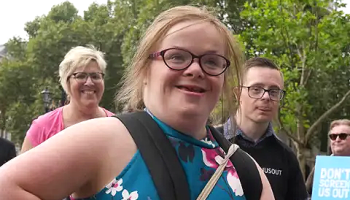By Charlotte Webster-
A woman with Down’s syndrome has lost her appeal over a law that allows abortion up until birth for a foetus with the condition.
Heidi Crowter , 27, (pictured)from Coventry, is one of the three claimants who brought legal action against the Department of Health and Social Care in the hope of removing a section of the Abortion Act they believe to be an “instance of inequality”.
Judges at the Court of Appeal decided the Abortion Act did not interfere with the rights of the living disabled.
Heidi said she and her team plan to “keep fighting” and take the case to the Supreme Court and “fight there”.
Under current legislation for England, Wales and Scotland, there is a 24-week time limit for abortion, unless “there is a substantial risk that if the child were born it would suffer from such physical or mental abnormalities as to be seriously handicapped”, which includes Down’s syndrome.
Heidi Crowter, who has the condition, argued that the rules were discriminatory to people with Down’s. She said the legislation “doesn’t respect my life” and brought a case against the government at the High Court in July 2021.
The case was brought by Ms Crowter and Maire Lea-Wilson, 33, from west London, whose son Aidan has Down’s syndrome.
In a summary of the decision, by Lord Justice Underhill, Lady Justice Thirlwall and Lord Justice Peter Jackson, the judges said: “The court recognises that many people with Down’s Syndrome and other disabilities will be upset and offended by the fact that a diagnosis of serious disability during pregnancy is treated by the law as a justification for termination, and that they may regard it as implying that their own lives are of lesser value.
“But it holds that a perception that that is what the law implies is not by itself enough to give rise to an interference with article 8 rights (to private and family life, enshrined in the European Convention on Human Rights),” the judges said.
Speaking outside the Court of Appeal, Heidi was visibly upset as she told family members “we lost”.
Speaking outside the Royal Courts of Justice in London after the ruling, Heidi Crowter said she may take her case to the Supreme Court.
She told reporters: ‘I am very upset not to win again, but I will keep on fighting because we have already informed and changed hearts and minds and changed people’s opinions about the law.
‘I am very upset that babies with Down’s Syndrome can be aborted up to birth.
‘This tells me that I am not valued and of much less value than a person without Down’s Syndrome.
‘I am angry that the judges say that my feelings don’t matter. That makes me feel that I am not as valuable as a person without Down’s Syndrome.
‘When we first started this court case not many people knew about the law, but now many, many people know about the law thanks to us and your amazing support.
‘We want to thank everyone who has donated their time and money to our court case.’
Comforted by her husband James, who also has Down’s syndrome, and mum Liz, Heidi said: “I will keep on fighting because we have already informed and changed hearts and minds and changed people’s opinions about the law.”
Solicitor Paul Conrathe called the judgement “disappointing and perplexing”, and said that the Court had “further diminished a fragile voice for equal value”.
Julia Smyth, representing the Secretary of State for Health and Social Care, said: ‘The ultimate question which underlies this appeal is where society should set the limits in criminalising women for the choices they make in deciding whether or not to have an abortion.
‘Obviously that raises profound social, moral and ethical questions and there are irreconcilable views on all sides of the debate.’
A Department of Health and Social Care spokesperson said abortion was an issue on which the government adopted “a neutral stance”.
“It is for Parliament to decide the circumstances under which abortions should take place, allowing members to vote according to their moral, ethical or religious beliefs.”

